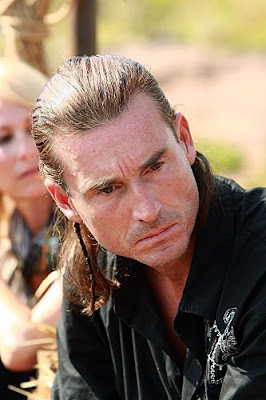
I started watching this show a couple of years ago, mostly because a lot of my students watched it and it gave us something we could talk about together. Those students are gone now, but I still watch the show because I find it to be an interesting study of people's behavior. As I watch the show I'm always struck by how many different kinds of personalities there are and the way living under extreme conditions brings out the best and worst in them.
As one watches the show, one can't help but to start rooting for, or against, certain players. Through my conversations with others who watch the show I've learned that viewers have many different reasons for liking or disliking characters. I'm always a little surprised at how many viewers choose favorites based on how a person looks. To me, that's completely insignificant. My favorite players are the ones who exhibit the strongest character.
By strongest character, I mean the players who possess personality traits such as trustworthiness, reliability, ingenuity, willingness to work hard, cooperation and leadership ability and who are able to exhibit these characteristics even under the most extreme circumstances.
Last season, there were two contestants who offered a sharp contrasts in character. One of them talked about the value of character, but didn't practice it, while the other practiced it, but didn't talk about it.
In one of his interviews early in the show, "Coach", as he wanted to be known, told viewers that he wanted to play the game "with honesty and integrity".

As the game went on, he called his allies "warriors" and himself the "dragonslayer". He would tell the other players stories of life and death experiences which he barely survived.
At other times, he would wander off by himself (but in full view of the other players) and engage in a martial arts/meditation routine that "only about 20 people in the world know about". Maybe, but it looked pretty hokey.
Other players weren't impressed.
"A 37 year old man who calls himself the Dragonslayer? Give me a break". said one (for that matter, why does a grown man want to known as "Coach"?.
Coach's behavior was designed to do two things: a) draw attention to himself and b) convince the world that he had experience that few others had and that it made him somehow better than everybody else. The "honor and integrity" line was just something he said to make himself look good.
Later in the show, Coach's true nature was revealed. When it was clear that he was losing his grip on the game, Coach suddenly changed his tune. On a day when it seemed like there was a chance that he would be sent to "Exile Island", where he would have to spend the night alone with no fire and no food, he pleaded not to be sent, saying that he had "asthma".
"Asthma?," asked another player, "we've been here 30 something days and that's the first time he's mentioned asthma. I think he's scared to go to exile."
They sent him anyway.
Later, in an immunity challenge requiring a great deal of mental toughness to win, Coach, the dragonslayer and martial arts practitioner, eliminated himself by collapsing onto the ground and curling himself into a ball. He claimed that his back hurt.
The dragonslayer had gone from mysterious and arrogant to just plain pathetic.
In almost direct contrast to Coach was J.T..

While Coach tried to create this mystical air about himself, J.T. described himself as a "just a Farm boy from Alabama". While Coach was "meditating", J.T. was fishing for the whole team or chopping wood or cooking. While Coach was telling stories about his wild "experiences", J.T. just listened, never talking about himself. When all of the contestants were asked "who would you trust with your life?", the unanimous choice was J.T.. When it obvious that it was time to vote Coach out of the game, the only player who didn't vote for him was J.T., because he once promised Coach that he would never vote against him. For all of Coach's talk about playing the game with honor and integrity, it was J.T. who actually did it.
In the end, J.T. became only the second unanimous winner in Survivor history.
Character counts.
Addendum: Honor and integrity? After the show was over, it was revealed that Coach isn't one. That's because he was fired from his job for lying. Apparently, he told the college for which he worked that he needed a leave of absence for "cancer tests". He actually left to play Survivor.
Somebody researched Coach's stories by matching his claimed dates and events to real events and the same times and locations. They didn't match.
Finally, somebody asked Coach where he learned his "meditation" routine. In a rare moment of honesty, he said he made it up for the show.
